[Big read] Malaysia leads ASEAN: Will Anwar deliver?
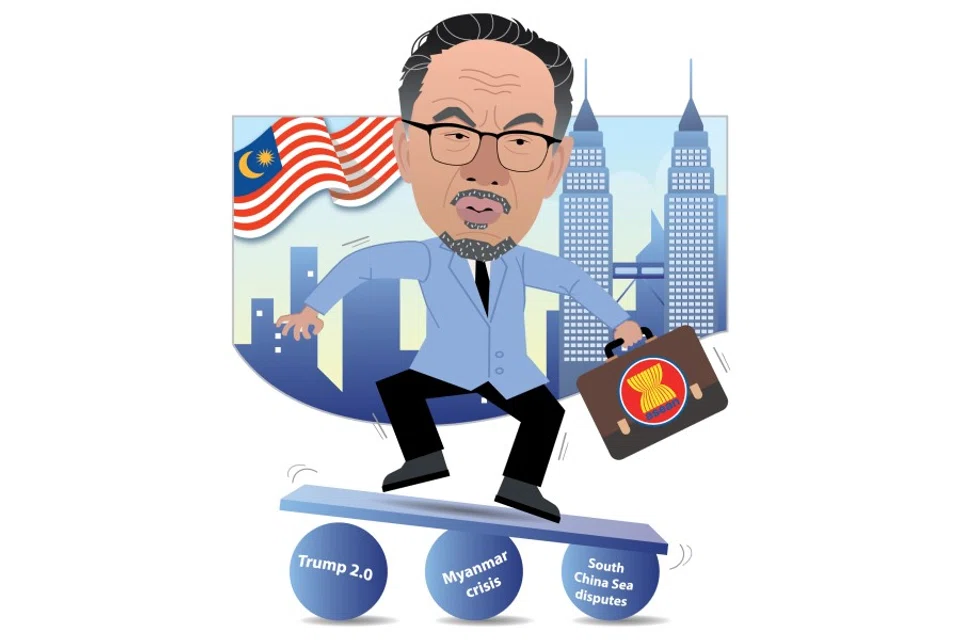
Malaysia, a founding member of ASEAN, will assume ASEAN chairmanship next year. Though Malaysia is expected to use the opportunity to exert its influence and achieve domestic and foreign policy goals, it will be met with no small number of obstacles, says Lianhe Zaobao associate foreign editor Liew Fan Chyi.
Malaysia is a founding member of ASEAN, and its prime ministers have achieved significant results in foreign affairs. For instance, its second prime minister Abdul Razak Hussein established a policy of non-alignment, while its fourth prime minister Mahathir Mohamad promoted the establishment of the East Asia Summit.
However, over the past decade, Malaysia has experienced multiple political setbacks. In addition to being mired in the 1MDB corruption scandal, its political scene has been turbulent since the federal government changed in 2018, with little progress made in foreign diplomacy.
This month marks two years since Anwar Ibrahim became prime minister. Malaysia’s domestic political situation is more stable now than it was after the 2018 general election.
Focused on growing economy and trade
With a stable domestic foundation, Anwar can focus on foreign affairs, including Malaysia’s upcoming ASEAN chairmanship. However, Trump’s election brings global uncertainty, especially in trade and economics. An escalated US-China trade war could significantly impact Southeast Asian countries, presenting substantial challenges for the next ASEAN chair.
Over the past two years, Anwar has focused on boosting regional trade and attracting foreign investments, both domestically and internationally. He has actively sought investments, pursued membership in BRICS, and visited China three times, signalling his commitment to advancing Malaysia’s economic development.
Strengthening economic and trade cooperation among ASEAN member states and with external partners will likely be Malaysia’s priority during its ASEAN chairmanship.
In a recent interview with Forbes magazine, Anwar outlined the agenda for Malaysia’s ASEAN chairmanship. He described ASEAN as a “vital trade platform” offering “simplified access to ten markets in Southeast Asia”. Anwar also spoke of how Malaysia’s resources and regional connections can benefit firms seeking to establish a presence in Southeast Asia. Furthermore, he emphasised Malaysia’s central role within ASEAN, noting that Malaysia’s strategic geographic position also enables broader trade opportunities with non-ASEAN partners, including India and Australia.
... it is expected that the US will also impose specific tariffs on Vietnam and other ASEAN countries. — Assistant Professor Liew Wui Chern, Universiti Tunku Abdul Rahman
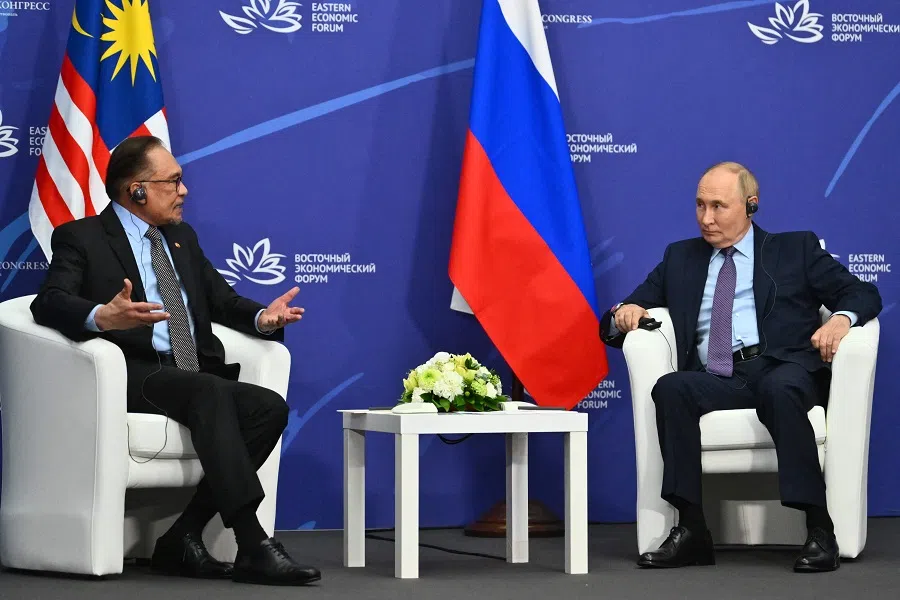
To increase his visibility, Anwar has been actively participating in various international events. As next year’s ASEAN chair, he has extended invitations to foreign leaders — such as Chinese President Xi Jinping and Russian President Vladimir Putin — to attend the ASEAN Summit during his visits abroad, in order to pave the way for stronger engagement between ASEAN and external countries in the coming year.
Challenging to achieve ASEAN’s three key strategies
Liew Wui Chern, an assistant professor of media and politics at Universiti Tunku Abdul Rahman, told Lianhe Zaobao that Anwar’s efforts show that enhancing regional trade cooperation is one of Malaysia’s main agendas
Putrajaya previously outlined three key strategies for ASEAN: bolstering regional value chains and regulatory cooperation as well as ties with the global economy; strengthening member countries’ fundamentals; and reinventing, restructuring and recalibrating their economies while leveraging each other’s strengths.
Significant obstacles hinder the achievement of these goals, however.
Tariffs war
One challenge includes the major uncertainty that accompanies the potential impact of Trump returning to power. For instance, the US could impose higher tariffs on ASEAN countries, which might prompt American businesses operating in the region to relocate in order to avoid diminished competitiveness caused by such tariffs.
“Trump is well aware that after expanding sanctions on China and raising tariffs, Chinese capital will inevitably shift to Southeast Asia, and goods will then be exported from Southeast Asia to the US. This would weaken the effectiveness of his tariff barriers, so it is expected that the US will also impose specific tariffs on Vietnam and other ASEAN countries,” Liew said.
The imposition of tariffs has already begun under current US President Joe Biden. Since last month, Washington has imposed tariffs on solar panel exports from Vietnam, Thailand, Malaysia and Cambodia. In particular, Chinese-funded solar panel factories in Vietnam have been significantly impacted, leading to reduced production and layoffs, while several Chinese-owned solar panel manufacturers have started relocating to Indonesia and Laos. This suggests that it is only a matter of time before the US imposes additional tariffs on the solar industries in Indonesia and Laos.
“For Anwar, BRICS represents a new opportunity. Since selling goods to the US or Western blocs entails higher tariffs, why not open up another channel and spread out risk by selling to the global south?” — Liew
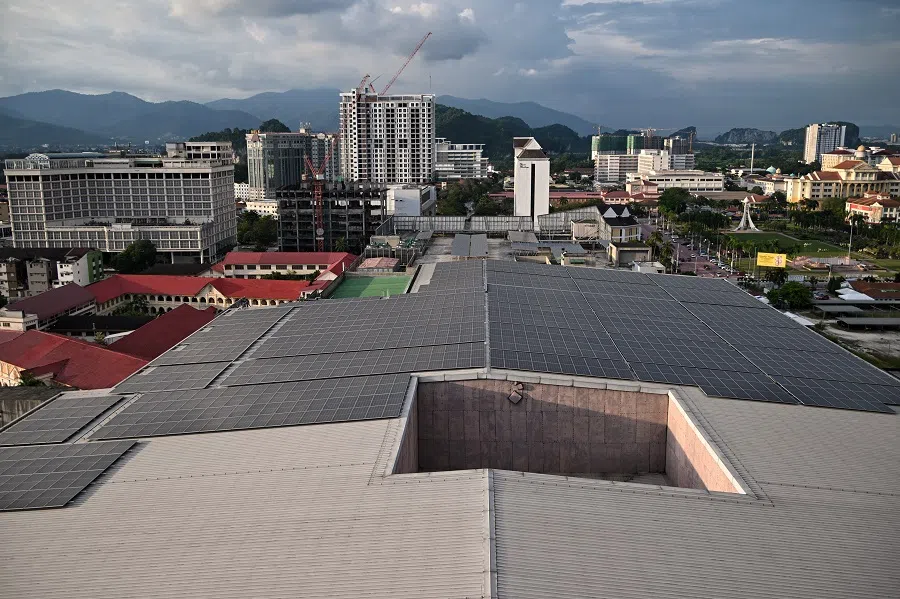
Liew noted that Malaysia has been aware of these developments for some time and has actively sought to join BRICS. “For Anwar, BRICS represents a new opportunity. Since selling goods to the US or Western blocs entails higher tariffs, why not open up another channel and spread out risk by selling to the global south?”
Kristina Fong, a researcher at ISEAS-Yusof Ishak Institute, said that a key priority for Malaysia during its ASEAN chairmanship will be meeting the ASEAN Community Vision 2025 and proposing new initiatives to formulate the ASEAN Community Vision 2045.
Regional integration and global collaboration
The current ASEAN Community Vision was formulated in 2015, with goals including collectively enhancing the regional bloc’s global influence and promoting regional economic integration.
Next year will thus be a significant one for ASEAN as a whole as it marks the conclusion of the past decade’s vision and the beginning of a new chapter.
Fong thinks that Malaysia will seize the opportunity provided by its 2025 ASEAN chairmanship to exert its influence and chart the course for the ASEAN Community Vision and strategic direction for the next 20 years.
She predicted that some significant ongoing initiatives — such as the Digital Economy Framework Agreement negotiations, as well as the upgrade negotiations for major free trade agreements like the ASEAN-China Free Trade Agreement— are expected to be finalised next year. The former is the first regional digital economy agreement in the world, while the latter is the first ASEAN-Plus free trade agreement with a standalone environmental chapter. Both initiatives mark significant progress in both the digital economy and sustainability arenas respectively.
“In terms of new initiatives, Malaysia will likely champion areas that it has established competitiveness in, such as the electronics sector and climate finance with its deep bond market. In terms of difficulties, if these initiatives are able to represent the economic needs of the region fairly and provide opportunities for the whole region to benefit from them, these initiatives are more likely to be strongly supported by all the ASEAN member states,” she added.
... this new path of interregional cooperation is a positive force in a fragmented and multipolar world.
Apart from strengthening interregional cooperation, Malaysia also has ambitious plans to deepen collaboration between ASEAN and its external partners. Anwar has already invited Xi to attend the ASEAN-Gulf Cooperation Council (GCC) Plus China Summit next year to establish a trilateral partnership.
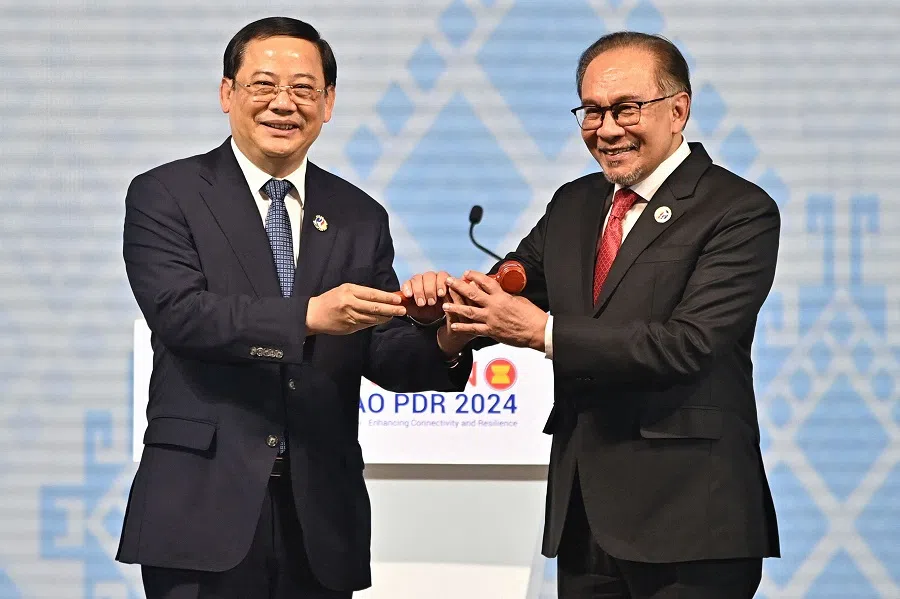
In a 19 November Nanyang Siang Pau article on the challenges facing the rotating ASEAN chairman, Malaysian economist Lee Heng Guie, executive director of the Associated Chinese Chambers of Commerce and Industry of Malaysia’s Socio-Economic Research Center, noted that this new path of interregional cooperation is a positive force in a fragmented and multipolar world.
“Malaysia hopes that further integration and cooperation will contribute to a sustainable future for the world, as it demonstrates the shared goals and values of two regional organisations (ASEAN and the GCC) and China in their pursuit of global relations,” he said.
Trump 2.0 a test of Malaysia’s leadership capability
Malaysia will face even greater challenges in demonstrating effective ASEAN leadership next year as it coincides with the start of Trump’s second presidency. The world will be paying close attention to how China-US relations will develop and how “Trumponomics” will affect the global economy when Trump takes office next year.
Fong thinks that the risks associated with Trump are not new to many Southeast Asian countries that have benefited from global supply chain shifts. These countries are aware that the China-US trade war is a double-edged sword, presenting both challenges and opportunities.
“Geopolitical risks — especially the ongoing volatility in Sino-US relationships — are a mainstay in modern foreign policy and a part of the global economic landscape that regional economies will have to grapple with and manage well. Any developments in this space, such as a new Trump administration or growing interest in non-US led minilaterals, will thus be part and parcel of this,” she said.
She added, “That said, Malaysia and other Southeast Asian countries more exposed to these risks should keep innovating and strengthening their technological capabilities to stay relevant in the global supply chain. Increasing competitiveness and having something that the global economy needs may be their best defence.”
“... Malaysia’s image in the US remains quite positive. It is likely that the US will not make things too difficult for Malaysia. Besides, it doesn’t seem that Trump intends to focus on Southeast Asia.” — Liew
On the other hand, Liew felt that there is no need for excessive concern. “Malaysia was recently removed from the US’s monitoring list for currency manipulation, indicating that Malaysia’s image in the US remains quite positive. It is likely that the US will not make things too difficult for Malaysia. Besides, it doesn’t seem that Trump intends to focus on Southeast Asia,” he said.
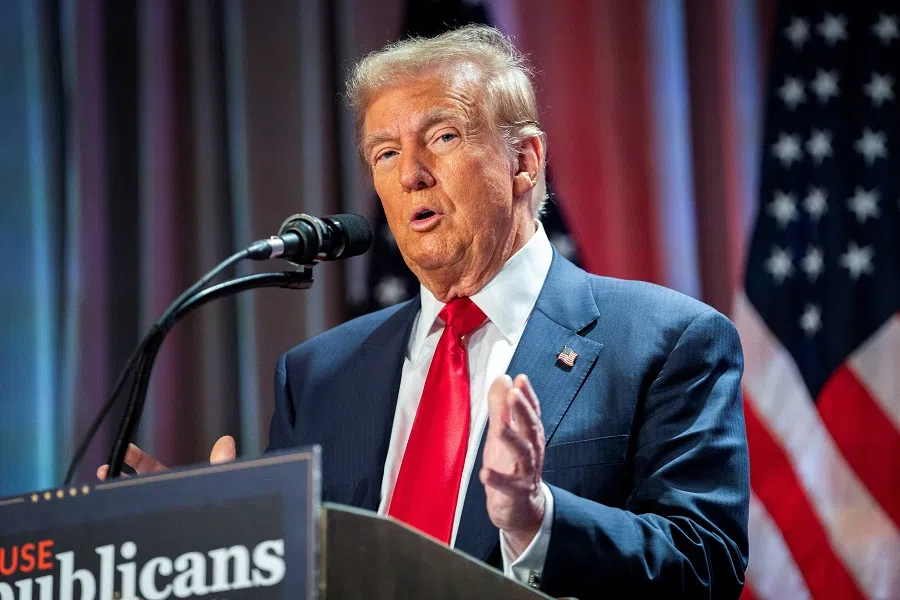
Malaysian public policy analyst Lim Teck Ghee thinks that ASEAN holds a relatively low priority on Trump’s agenda. In his column in Oriental Daily News, Lim pointed out that the incoming Trump administration has bigger concerns to deal with in Europe, the Middle East and China.
“Demolishing the deep state and overhauling deep-rooted forces that have long occupied Washington will take up most of his time and be his biggest challenge,” he wrote.
Academic: Trump needs ASEAN to keep China in check
Lim felt that Trump’s hawkish foreign policy advisors do think that ASEAN is a regional force that should be accorded due respect. If Trump wants to counter China’s influence more strongly, he needs to court ASEAN and draw them closer to the US.
Fang pointed out that ASEAN countries continue to take a neutral stance on economic matters, according to the State of Southeast Asia: 2024 Survey Report released in early April by the ISEAS-Yusof Ishak Institute’s ASEAN Studies Centre. It is expected that this stance will not undergo significant changes during the Trump 2.0 era.
The Myanmar crisis and the South China Sea sovereignty dispute are two major “chronic ailments” for ASEAN. Anwar has repeatedly stated that he will focus primarily on these two topics.
Since taking office as prime minister of Malaysia, Anwar has actively and prominently spoken out on critical regional and global issues. For instance, he has made clear statements on China-US relations, the Israel-Hamas conflict and the Myanmar issue. This outspokenness has led to increased expectations for Malaysia’s role as a leader in solving ASEAN problems.
The Myanmar issue has always been ASEAN’s achilles heel. After the military coup in Myanmar in February 2021, ASEAN reached a Five-Point Consensus with the Myanmar military junta in April of the same year, which included stopping violent repression and engaging in constructive dialogue with relevant parties. However, these consensus points have yet to be implemented.
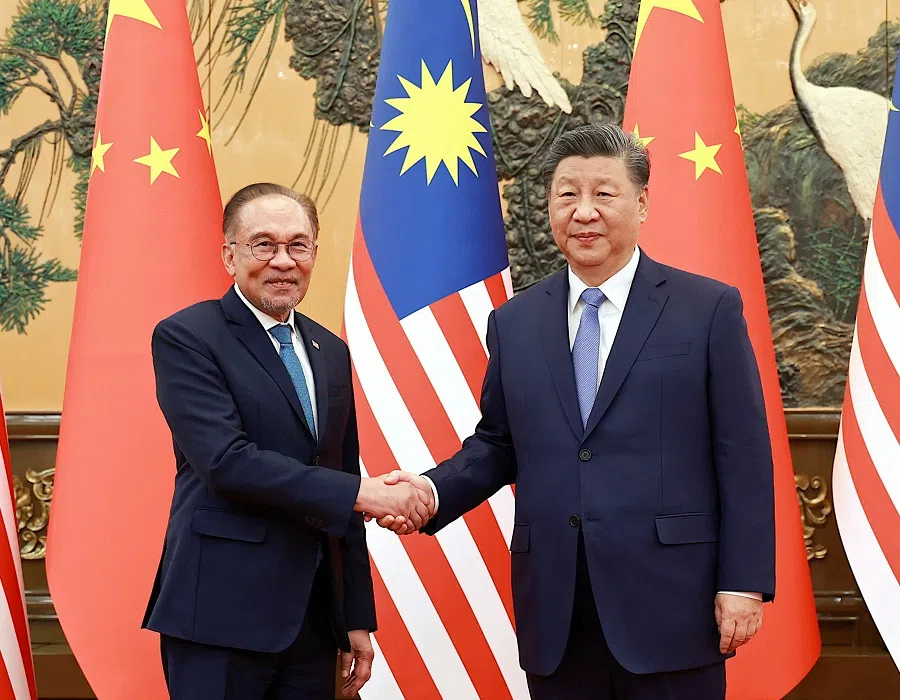
Anwar hopes to resolve this issue during his chairmanship. Successfully persuading Myanmar’s military to accept and implement the Five-Point Consensus would be an outstanding achievement for both Malaysia and Anwar personally.
Anwar has stated that he will put pressure on the military junta over the Myanmar crisis, but this is easier said than done.
Malaysia lacks diplomats who can engage and negotiate directly with the military junta, making it extremely challenging for Anwar to resolve the Myanmar crisis. — Liew
Liew stated this was indeed something ASEAN has never done before. However, the experience of past military rule in Myanmar — such as the period from 1988 to 2010 — indicated that the Myanmar military will ignore external pressure, and will only agree to a compromise if they feel that their regime is threatened from within. Liew added that the political reforms that began in Myanmar in 2010 were initiated by the military to consolidate their own interests.
Myanmar and South China Sea: Crisis and opportunity
Additionally, Liew opined that Malaysia lacks diplomats who can engage and negotiate directly with the military junta, making it extremely challenging for Anwar to resolve the Myanmar crisis.
Anwar is also looking to implement the Code of Conduct in the South China Sea (COC) during Malaysia’s term as rotating ASEAN chair, and to make significant progress on this document, which has been under negotiation since the 2010s.
Achieving progress on the COC will be as challenging as dealing with the Myanmar crisis. The framework of the COC is based on the United Nations Convention on the Law of the Sea (UNCLOS). However, in 2016 the International Tribunal ruled — based on the UNCLOS — that China’s claim to sovereignty over the South China Sea using the nine-dash line had no legal basis. This ruling has never been recognised by China.
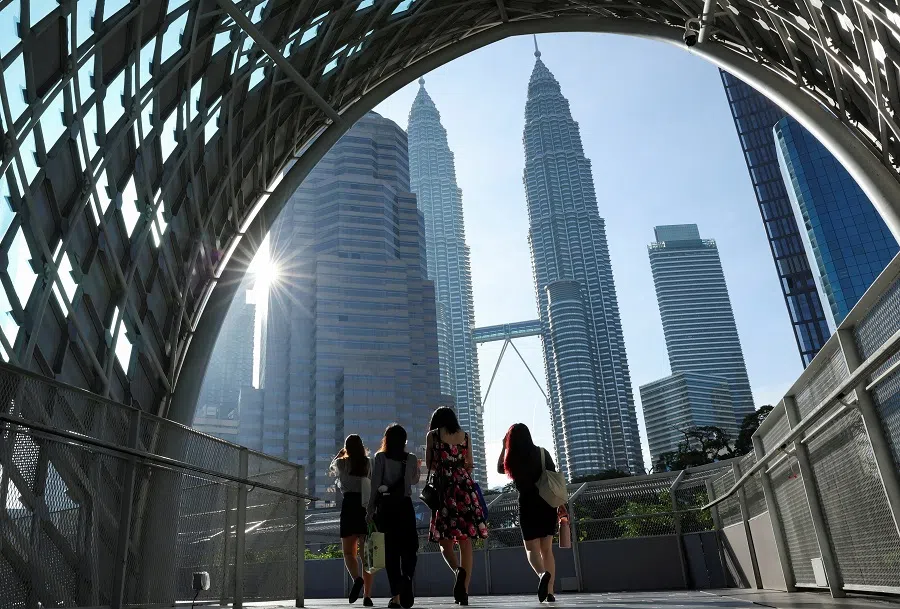
Liew argues that getting China to recognise the COC is akin to asking China to overturn its 2016 stance, which denied the UNCLOS’ ability to address the South China Sea issue. Additionally, the recent implementation of two maritime laws by the Philippines, which emphasise the Philippines’ claims to sovereignty over the South China Sea and Sabah, further complicates the implementation of the COC.
On 8 November, Philippine President Ferdinand “Bongbong” Marcos Jr signed the Philippine Maritime Zones Act and the Philippine Archipelagic Sea Lanes Act. The former establishes routes in Philippine waters and airspace to clarify the country’s maritime rights, while the latter sets up a system for foreign ships and aircraft to exercise passage rights. In response, China’s Ministry of Foreign Affairs protested that the Acts would complicate the situation in the South China Sea. Malaysia also indicated it would issue a diplomatic note to the Philippines to protest the new laws, which infringe on Sabah’s sovereignty.
Despite these challenges, Anwar has led a unity government since he took office as prime minister in November 2022. It is composed of various factions to achieve political stability and economic growth within two years, and has given some political observers confidence in his ability to promote ASEAN unity and deepen relationships with external partners.
Maintaining ASEAN unity while handling these issues properly will be the greatest test of Anwar’s diplomatic prowess.
Domestic unity and solving external problems both tall orders
According to Liew, Anwar has indeed given the impression of being adept at navigating various situations since coming to power. Domestically, Anwar has effectively managed racial and religious sentiments, defusing crises sparked by the opposition’s manipulation of such issues. Externally, Anwar has refused to take sides between major powers, maintaining friendly relations with both China and the US to benefit from US-China competition.
However, Liew pointed out that domestic and international situations are entirely different. The relationships between countries are primarily driven by national interests, and the issues involved are far more complex than those in domestic affairs.
Liew raised the example of a sovereignty dispute between the Philippines and Malaysia over Sabah; as both also have a sovereignty dispute with China in the South China Sea, Malaysia would have to make concessions to resolve these issues. Maintaining ASEAN unity while handling these issues properly will be the greatest test of Anwar’s diplomatic prowess.
This article was first published in Lianhe Zaobao as “马国明年任主席国 安华烈火雄心不息 率亚细安再拼政绩”.





